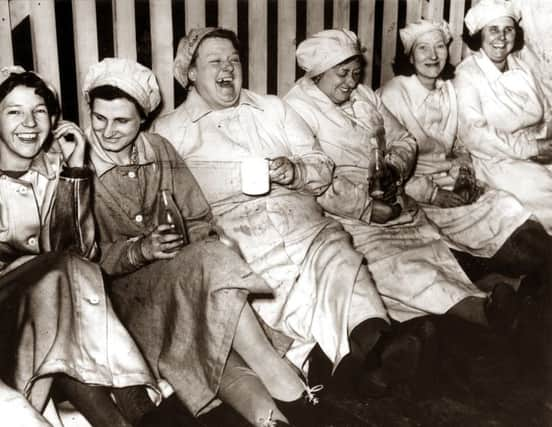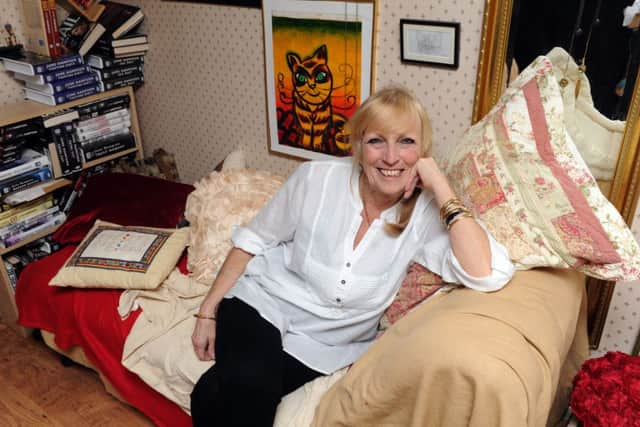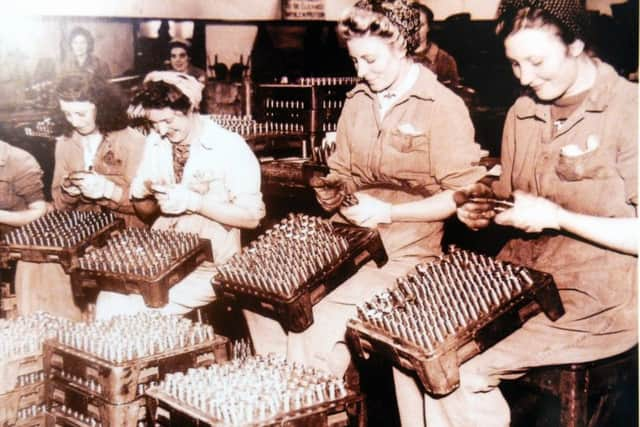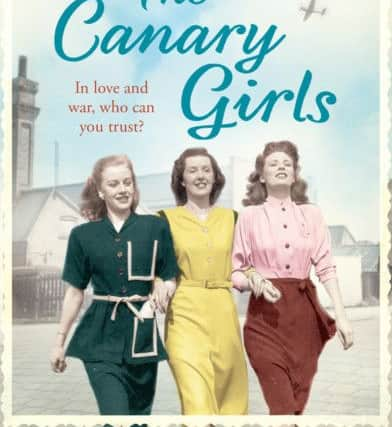Bomb factory girls sparked my imagination


It was Britain’s darkest hour. In 1941, as the country struggled to adjust to the harsh reality of war with Hitler’s Germany, a huge secret army of women was being called up.
They came from every part of the country. Many were rural teenagers who had only ever worked in poorly-paid domestic service.
Advertisement
Hide AdAdvertisement
Hide AdSome were already war widows or, in the case of the Portsmouth area with its huge supply of men for the Royal and Merchant navies, had husbands posted overseas, destination unknown.


Others had never worked before. Yet their work, a vast enterprise conducted in total secrecy in newly-built complexes, factories, and, as in this area’s case, traditional Royal Navy armaments’ depots, was one of the most dangerous, dirty and exhuasting jobs of the Second World War.
For these were the Bomb Girls, the one million British women who worked in the munitions factories until victory in 1945.
Many, like the hundreds on the production lines in Gosport and Portsmouth, were working in areas at the top of the Luftwaffe’s list of targets.
Advertisement
Hide AdAdvertisement
Hide AdIf every air raid terrifed the hell out of the civilian population, imagine what it must have been like to have been stuck in one of these factories surrounded by high explosives and then have them raining down on your head.


The women handled chemicals that turned their skin yellow. That was how they gained their other nickname – Canary Girls.
Their hair became discoloured, they came out in rashes and many suffered breathing problems or asthma. Some went home with acid burns. An unlucky few went off to work in the morning but didn’t come back at all.
But throughout the danger and drudgery of it all, these women kept us in the war, just as they had done in the Frst World War. Without them our servicemen, ships, tanks and aircraft would have had nothing to fire.
Advertisement
Hide AdAdvertisement
Hide AdAnd despite everything they managed to stay cheerful, relying on that never-say-die British spirit, even though they might have been blown to smithereens at any moment.


It’s an atmosphere captured beautifully in the main picture here of munitions workers at Priddy’s Hard, Gosport.
With Mothering Sunday tomorrow and International Women’s Day on Tuesday, it is worth sparing a thought for these women, for they, although they probably didn’t realise it at the time, did more for women’s equality than any other group of women.
It’s a subject very close to June Hampson’s heart. Writing under her pen name Rosie Archer, the prolific author has just had published the second in a four-novel series of books inspired by the women who enabled their men to fight.
Advertisement
Hide AdAdvertisement
Hide AdHer Gosport home virtually backs on to Priddy’s Hard with its Explosion! museum. From there she drew inspiration for the series of books commissioned by publishers Quercus.


The second, Canary Girls, has just been published and continues the stories of the women who worked at Priddy’s Hard and who appeared in the first, The Munitions Girls.
Her novel focuses on how the female community of Gosport supported the war effort and what effect this had on domestic life at the time.
‘What I wanted do do,’ she says, ‘was to show how these women stuck together in times of trouble, how they got around their problems and how they bonded together in pretty awful conditions. And how they had good times when things went right.’
Advertisement
Hide AdAdvertisement
Hide AdBorn in 1941, June was shocked by what the workers went through.
‘You were not allowed to wear anything that might cause a spark.
‘Everybody had to change when they got to work – navy blue boilersuits and white headscraves. Heaven forbid if you took a box of matches anywhere near the place.’


She is passionate about Gosport, her birthplace, and its people.
Advertisement
Hide AdAdvertisement
Hide Ad‘It’s a wonderful town and I don’t have to look very far for inspiration for my characters. They all exist in Gosport!
‘I met many of them when I ran a second-hand book stall outside the town hall twice a week for many years.’
To make ends meet over the decades, June has done a variety of jobs: including waitress, fruit picker, barmaid and shop assistant.
The books do explore dark places which existed in everyday life during the war – abortion and crime, for example.
Advertisement
Hide AdAdvertisement
Hide Ad‘There’s no point in pretending the world is all nicey, nicey, is there?’ says June, who has been a full-time writer since 2008.
That happened on holiday in Kenya. ‘I’d decided I was going to use that trip to write a novel, so I went to Woolworth’s, bought a pack of five exercise books for 58p and took them away with me.
‘I wrote constantly on that trip and when I got home I sent the first 100 pages to a publisher. I was lucky because they picked me up straight away. That is very rare,’ she says.
She had started writing short stories years before and had them published in magazines. She says: ‘I was prolific. I was lucky because I used to write for a magazine, about three or four stories a month.’ Gradually, she started to make a living out of writing.
Advertisement
Hide AdAdvertisement
Hide AdThat first novel told the story of Daisy Lane, a young girl growing up in Gosport as a member of the criminal underworld. The name Daisy Lane came from the road where June’s school, Gosport Central, was.
She has just submitted the fourth novel in the series while the third will be published this summer.
June adds: ‘I write because I love falling through a hole in the paper. It’s a wonderful experience to watch a character grow out of my imagination.’
June spent her childhood with her head stuck in books.One day at school a teacher wrote at the bottom of one of her essays that she had a vivid imagination. ‘I loved that! It’s stuck with me to this day.’
Advertisement
Hide AdAdvertisement
Hide AdCanary Girls by Rosie Archer is published by Quercus at £6.99.
‘... her body disintegrated’
Almost a million British women worked in munitions factories during the Second World War, making weapons such as shells and bullets.
Munitions work was often well-paid, but involved long hours, sometimes up to seven days a week.
Workers were also at serious risk from accidents when using dangerous machinery or working with highly explosive material.
Advertisement
Hide AdAdvertisement
Hide AdIn February 1944 there was a serious accident at the Royal Ordnance Factory in Kirby, Lancashire.
In one building 19 workers, mainly women, were filling trays of anti-tank mine fuses when one of the fuses exploded, setting off the rest of the fuses in the tray.
The Daily Telegraph reported what happened next:
‘The girl working on that tray was killed outright and her body disintegrated; two girls standing behind her were partly shielded from the blast by her body, but both were seriously injured, one fatally. The factory was badly damaged: the roof was blown off, electric fittings were dangling precariously; and one of the walls was swaying in the breeze.’
Some munitions workers handled toxic chemicals every day.
Those who handled sulphur were nicknamed Canary Girls, because their skin and hair turned yellow from contact with the chemical.
They were not allowed to tell anyone where they worked. Yet the danger they faced each day in the factories and even on their way to work during night-time bombing raids in the blackout was huge.